
The Cyperaceae are a family of graminoid (grass-like), monocotyledonous flowering plants known as sedges. The family is large, with some 5,500 known species described in about 90 genera, the largest being the "true sedges" genus Carex with over 2,000 species.
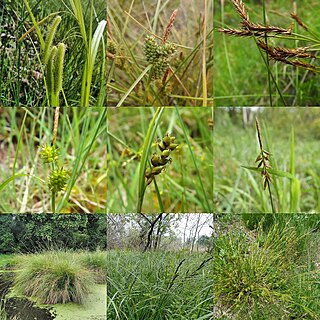
Carex is a vast genus of nearly 2,000 species of grass-like plants in the family Cyperaceae, commonly known as sedges. Other members of the family Cyperaceae are also called sedges, however those of genus Carex may be called true sedges, and it is the most species-rich genus in the family. The study of Carex is known as caricology.
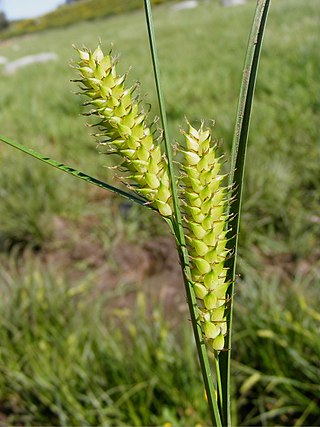
Carex vesicaria is an essentially Holarctic species of sedge known as bladder sedge, inflated sedge, and blister sedge. It has been used to insulate footwear in Norway and among the Sami people, and for basketry in North America.

Rhizina undulata, commonly known as the doughnut fungus or the pine firefungus, is a species of fungus in the family Rhizinaceae. The fruit bodies of the fungus are dark purple brown with a bright yellow margin, crust-like and attached to the growing surface by numerous root-like yellow rhizoids. R. undulata has a cosmopolitan distribution, and commonly occurs on clearings or burned areas throughout central and northern Europe, North America, northern Asia, and southern Africa. It is parasitic on conifer seedlings, and has caused considerable damage to tree plantations worldwide.

Carex pilulifera, the pill sedge, is a European species of sedge found in acid heaths, woods and grassland from Macaronesia to Scandinavia. It grows up to 30 cm (12 in) tall, with 2–4 female spikes and 1 male spike in an inflorescence. These stalks bend as the seeds ripen, and the seeds are collected and dispersed by ants of the species Myrmica ruginodis.
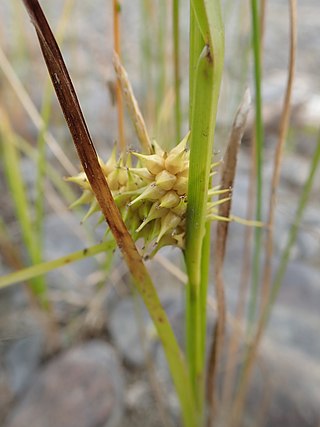
Carex cryptolepis, known as northeastern sedge, is a North American species of sedge first described by Kenneth Mackenzie in 1914.
Carex gunniana is an Australia species of sedge that was first described in 1845 by Boott in the Proceedings of the Linnean Society of London. It is native to eastern Australia and Tasmania.

Carex lanceolata is a species of sedge, native to the eastern half of China, Mongolia, eastern Siberia, Korea, Sakhalin, and Japan. Its seeds are dispersed by ants.

Carex bebbii, Bebb's sedge, is a species of sedge native to the northern United States and Canada. Carex bebbii grows in a variety of wetland habitats such as lakeshores, streambanks, ditches, meadows, swamps, and seeps. It forms dense tufts with culms up to 90 centimeters tall.

Carex viridula, known as little green sedge, green sedge, or greenish sedge, is a small flowering plant native to North America, Europe, Asia, and Morocco.
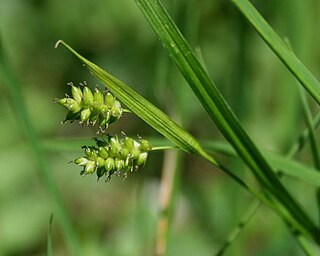
Carex pallescens, called pale sedge, is a widespread species of flowering plant in the genus Carex, native to the northeastern United States, eastern Canada, Iceland, Europe, Tunisia, and western Asia. It has unstable chromosome numbers.
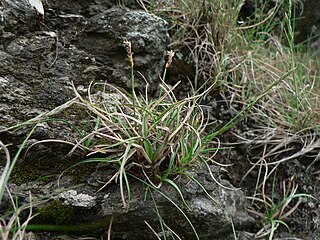
Carex rupestris, called the curly sedge and rock sedge, is a species of flowering plant in the family Cyperaceae, native to temperate and subarctic North America, Greenland, Iceland, Europe, and Asia. It prefers to grow on rocky ledges.

Carex stipata, variously called the prickly sedge, awl-fruited sedge, awlfruit sedge, owlfruit sedge, swamp sedge, sawbeak sedge, stalk-grain sedge and common fox sedge, is a species of flowering plant in the genus Carex, native to Canada, the United States, China, Korea, Japan, and Far Eastern Russia. It is a wetland obligate.

Carex dioica, the dioecious sedge, is a species of flowering plant in the genus Carex, native to Iceland, the Faroes, Svalbard, nearly all of Europe, western Siberia, and the Altai. It prefers to live in calcareous fens.
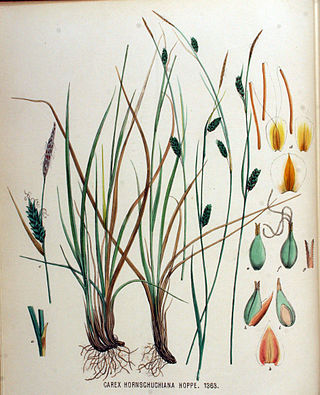
Carex hostiana, the tawny sedge, is a species of flowering plant in the genus Carex, native to Europe and northeast Canada, and extinct in Massachusetts. It is a member of the Carex flava species complex.
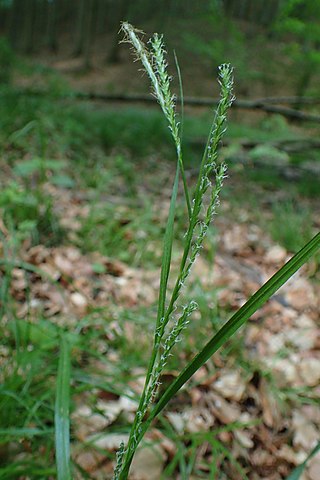
Carex strigosa, the thin-spiked wood sedge, is a species of flowering plant in the genus Carex, native to Europe and the Caucasus region. Its diploid chromosome number is 2n=66.
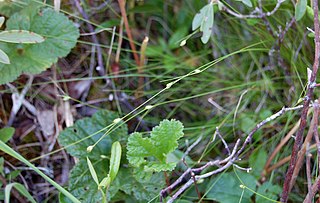
Carex trisperma, the three-seeded sedge, is a species of flowering plant in the genus Carex, native to Canada, Greenland, and the northeastern United States. It is typically found in acidic bogs within forests.

Carex maritima, called the curved sedge, is a species of flowering plant in the genus Carex, with a bipolar distribution in mountains and cold regions. It dispersed in the Pleistocene from the northern to the southern hemisphere.

Carex vestita, also commonly known as velvet sedge, is a tussock-forming species of perennial sedge in the family Cyperaceae. It is native to eastern parts of the United States.

Carex dissitiflora is a tussock-forming species of perennial sedge in the family Cyperaceae. It is native to parts of Japan and Taiwan.



















